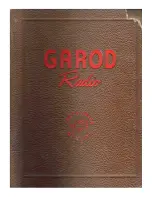
23
ENGLISH
SURROUND MODE
The SR5300 is equipped with many surround modes. These are
provided to reproduce a variety of surround sound effects, according
to the content of the source to be played.
The available surround modes may be restricted depending on the
input signal and speaker setup.
AUTO
When this mode is selected, the receiver determines whether the
digital input signal is Dolby Digital, Dolby Digital Surround EX, DTS,
DTS-ES or PCM-audio.
Surround EX & DTS-ES will operate for multi channel source that has
a Dolby Digital Surround EX or DTS-ES auto trigger flag in the digital
signal.
When a Dolby Digital or DTS signal is input, the number of channels
for which the corresponding signal is encoded will be played.
Inputting a Dolby Digital two channel signal with Dolby surround status
automatically subjects that signal to Pro Logic
II
movie processing
before play.
PCM 96 kHz source material can be played in this mode.
Notes:
• When you use this mode with certain DVD and CD players,
performing operations such as “Skip” or “Stop” may
momentarily interrupt the output.
• When the signal is not decoded is input for using mode, the
mode is changed to AUTO mode automatically. Refer to page
25 to confirm the available decoding mode.
PRO LOGIC II MOVIE, PRO LOGIC II MUSIC, PRO LOGIC
This mode is used with source materials encoded in Dolby Digital and
Dolby Surround.
Dolby Pro Logic II brings the excitement of surround sound to any
stereo mix, while making existing Dolby Surround mixes sound more
like discrete 5.1 channels Surround sound.
Dolby Pro Logic II has below 3 modes.
Pro Logic II MOVIE
This mode provides 5.1 channel surround sound from Dolby Surround
encoded stereo movie sound tracks.
Pro Logic II MUSIC
This mode provides 5.1 channel surround sound from conventional
stereo sources, analog or digital, such as CD, tape, FM, TV, stereo
VCR, etc.
PRO LOGIC
This mode emulated original Dolby Pro Logic decoding (3/1 surround)
suit for Dolby Surround encoded stereo movie soundtracks.
Notes:
• Pro Logic II mode is available to 2ch input signal which is
encoded Dolby Digital or PCM format.
• PCM-audio signals can be subjected to Pro Logic processing
when the sampling frequency is 32 kHz, 44.1 kHz or 48 kHz.
EX/ES
This mode provides 6.1 channel surround for DOLBY DIGITAL EX,
DTS-ES encoded source material such as DVD.
This mode cannot be used when an analog input has been selected.
Dolby Digital EX
In a movie theater, film soundtracks that have been encoded with
Dolby Digital surround EX technology are able to reproduce an extra
channel which has been added during the mixing of the program.
This channel, called Surround Center, places sounds behind the
listener in addition to the currently available front left, front center,
front right, surround right, surround left and subwoofer channels.
This additional channel provides the opportunity for more detailed
imaging behind the listener and brings more depth, spacious
ambience and sound localization than ever before.
Dolby Digital EX is not available in the system without surround center
speaker(s).
DTS-ES (Discrete 6.1, Matrix 6.1)
DTS-ES adds the surround center channel audio to the DTS 5.1-
channel format to improve the acoustic positioning and makes
acoustic image movement more natural with the 6.1-channel
reproduction.
This receiver incorporates a DTS-ES decoder, which can handle DTS-
ES Discrete-encoded and DTS-ES Matrix-encoded program sources
from DVD, etc..
DTS-ES Discrete 6.1 features digital discrete recording of all channels
including the surround center channels and higher quality of audio
reproduction.
DTS-ES is not available in the system without surround center
speaker.
DTS
This mode is for DTS encoded source materials such as LASER
DISC, CD, and DVD.
The DTS mode cannot use when an analog input has been selected.
Note:
• When use DTS Music source, LFE level is set to - 10 dB by LFE
LEVEL of SURROUND in the SETUP MAIN MENU (See
page 18) as DTS’s recommendation.
DTS NEO: 6 (NEO:6 CINEMA, NEO6: MUSIC)
This mode decodes 2-channel signals into 6-channel signals using
high-accuracy digital matrix technology.
The DTS NEO:6 decoder has near-discrete properties in the
frequency characteristics of the channels as well as in channel
separation.
According to the signals to be played back, DTS NEO:6 uses either
the NEO:6 CINEMA mode optimized for movie playback or the NEO:6
MUSIC mode optimized for music playback.
Note:
• PCM-audio (32 kHz, 44.1 kHz or 48 kHz) and analog source
material can playback in this mode.
MULTI CH. ST
This mode is used to create a wider, deeper and more natural
soundstage from two channel source material.
This is done by feeding the left channel signal to both left front and left
surround speaker and the right channel signal to both right front and
right surround speaker. Additionally, the center channel reproduces a
mix of the right and left channel.
CIRCLE SURROUND II (CSII-CINEMA, CSII-MUSIC, CSII-MONO)
Circle Surround is designed to enable multi-channel surround sound
playback of non-encoded and multi-channel encoded material.
Backward compatibility provides listeners with up to 6.1 channels of
surround performance from entire collection of music and film,
including broadcast, videotape and stereo recorded music.
Regarding to source material, you can select
CSII-Cinema
mode,
CSII-Music
mode or
CSII-Mono
mode.
Note:
• PCM-audio (32 kHz, 44.1 kHz or 48 kHz) and analog source
material can playback in this mode.
VIRTUAL
This mode creates a virtualized surround sound experience from a
two-speaker (front L and R) playback system playing any multi-
channel audio source (such as found on DVDs and digital
broadcasts), including Dolby Digital, , Dolby Pro Logic or DTS.
SRS TruSurround, SRS and
symbol are trademarks of SRS
Labs, Inc.
SRS TruSurround technology is incorporated under license from SRS
Labs, Inc.
DSP SURROUND (MOVIE, HALL, STADIUM, MATRIX)
These modes provide surround effect processing from each input
source material.
They will produce theater, concert hall and stadium like atmospheres.
Select as your taste desires.
Note:
• PCM-audio (32 kHz, 44.1 kHz or 48 kHz) and analog source
material can playback in this mode.












































